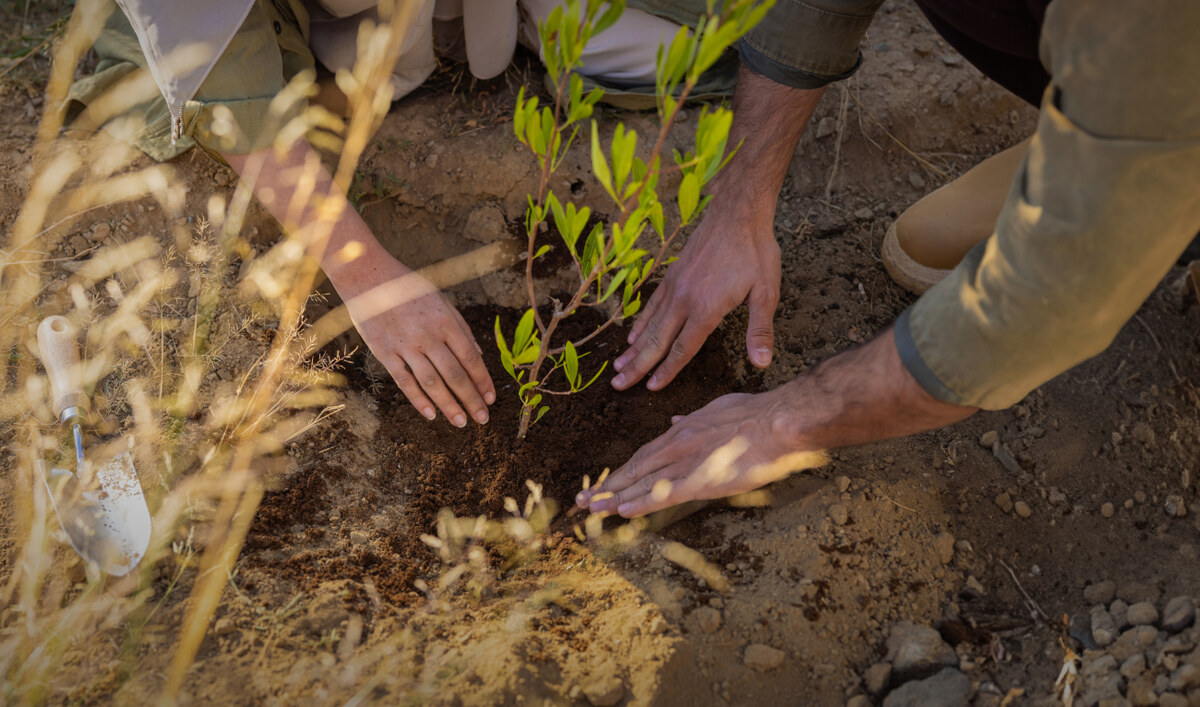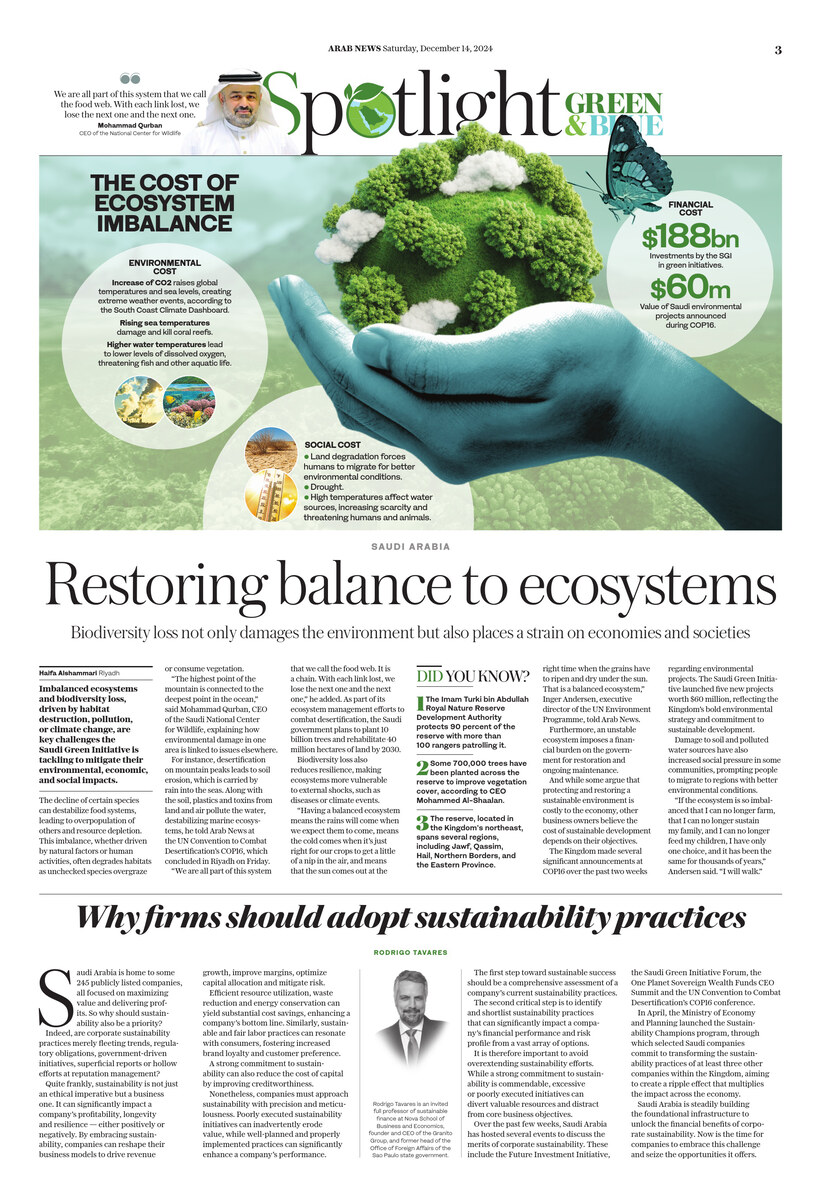RIYADH: Imbalanced ecosystems and biodiversity loss, driven by habitat destruction, pollution, or climate change, are key challenges the Saudi Green Initiative is tackling to mitigate their environmental, economic, and social impacts.
The decline of certain species can destabilize food systems, leading to overpopulation of others and resource depletion. This imbalance, whether driven by natural factors or human activities, often degrades habitats as unchecked species overgraze or consume vegetation.
“The highest point of the mountain is connected to the deepest point in the ocean,” said Mohammad Qurban, CEO of the Saudi National Center for Wildlife, explaining how environmental damage in one area is linked to issues elsewhere.
For instance, desertification in mountain peaks leads to soil erosion, which is carried by rain into the seas. Along with the soil, plastics and toxins from land and air pollute the water, destabilizing marine ecosystems, he told Arab News at the UN Convention to Combat Desertification’s COP16, which concluded in Riyadh on Friday.
“Where does this go? It goes to the ecosystem,” Qurban said, referring to the movement of toxins from land to the sea. “So, we start losing coral reefs, seagrass, and we start losing fish.
“We are all part of this system that we call the food web. It is a chain. With each link lost, we lose the next one and the next one.”

As part of its ecosystem management efforts to combat desertification, the Saudi government plans to plant 10 billion trees and rehabilitate 40 million hectares of land by 2030.
The Kingdom also aims to protect 30 percent of its land and marine areas by 2030 through the 30x30 initiative, which Qurban discussed last week during the session “MEAs Synergies for Strengthened Environmental Governance: Insights from the Bern III Conference,” held on the sidelines of COP16.
Qurban said disturbances in one animal population can have consequences elsewhere, such as the overpopulation of another species. In his recent interview with Arab News, he recounted an incident in which a farmer once reached out to the NCW, concerned about snakes on his land and requested their removal.
The center explained that while they could address the situation, it was important to consider the ecological balance. Snakes play a key role in maintaining this balance by controlling rodent populations and removing them could disrupt the natural harmony of the habitat.

As part of its ecosystem management efforts to combat desertification, the Saudi government plans to plant 10 billion trees and rehabilitate 40 million hectares of land by 2030. (SGI)
The UN has said that a million animal and plant species worldwide are at risk of extinction as a result of human-induced environmental issues.
Biodiversity loss also reduces resilience, making ecosystems more vulnerable to external shocks, such as diseases or climate events.
“Having a balanced ecosystem means the rains will come when we expect them to come, means the cold comes when it’s just right for our crops to get a little of a nip in the air, and means that the sun comes out at the right time when the grains have to ripen and dry under the sun. That is a balanced ecosystem,” Inger Andersen, executive director of the UN Environment Programme, told Arab News.
Restoring balance is essential for maintaining healthy ecosystems, which sustain life on Earth, including human communities that depend on these natural systems for resources and services.
“Some people who are living in the cities may not think that they are relying on the ecosystem because they get their food from the grocery store,” Andersen said. “But the reality, of course, is that there is an ecosystem somewhere in the world that provides that food that they purchased. So, we are all relying on that ecosystem.”
DID YOU KNOW?
- The Imam Turki bin Abdullah Royal Nature Reserve Development Authority protects 90 percent of the reserve with more than 100 rangers patrolling it.
- About 700,000 trees have been planted in the reserve to improve vegetation cover, according to CEO Mohammed Al-Shaalan.
- The reserve, which is in the Kingdom’s northeast, spans several regions, including Jawf, Qassim, Hail, Northern Borders, and the Eastern Province.
Furthermore, an unstable ecosystem imposes a financial burden on the government for restoration and ongoing maintenance.
In Asir, in the Kingdom’s southwest, the decline in Arabian leopard populations led to a significant increase in the baboon population. Large troops of baboons, typically found in the southern mountain ranges, have negatively affected local communities. As a result, despite the region’s stunning landscapet, tourism in the area has declined in recent years.
“People lost tourists in Asir because of the baboons,” said Qurban, citing safety concerns. “Some people abandoned their farms; they abandoned their farms completely in Asir and Al-Baha.”
And while some argue that protecting and restoring a sustainable environment is costly to the economy, other business owners believe the cost of sustainable development depends on their objectives.

In Asir, in the Kingdom’s southwest, the decline in Arabian leopard populations led to a significant increase in the baboon population. (SPA)
During a panel discussion at COP16, Prince Khaled bin Alwaleed, CEO of the asset management company KBW Ventures, discussed the economics of ecosystems and the real financial costs of implementing green development.
He said that solutions vary by location and must align with the private sector’s objectives to effectively implement sustainable development goals.
“It is not a one size fits all,” he said. “It is a bouquet of opportunities that you have to be customized for it to be actually scalable and profitable for the private sectors and industries in these private sectors to actually flourish.”

During a panel discussion at COP16, Prince Khaled bin Alwaleed, CEO of the asset management company KBW Ventures, discussed the economics of ecosystems and the real financial costs of implementing green development. (AN Photo by Huda Bashatah)
Although securing a balanced ecosystem may be costly, the Kingdom made several significant announcements at COP16 over the past two weeks regarding environmental projects.
The Saudi Green Initiative launched five new projects worth $60 million, reflecting the Kingdom’s bold environmental strategy and commitment to sustainable development. This brings the total investment in SGI projects to more than $188 billion.
But Saudi Arabia is not alone in its commitment to green development; many countries share this goal. However, some urban activities can inadvertently harm the environment despite efforts to protect it.
Damage to soil and polluted water sources have also increased social pressure in some communities, prompting people to migrate to regions with better environmental conditions for their families and future.
“If the ecosystem is so imbalanced that I can no longer farm, that I can no longer sustain my family, and I can no longer feed my children, I have only one choice, and it has been the same for thousands of years,” Andersen said. “I will walk.”



































